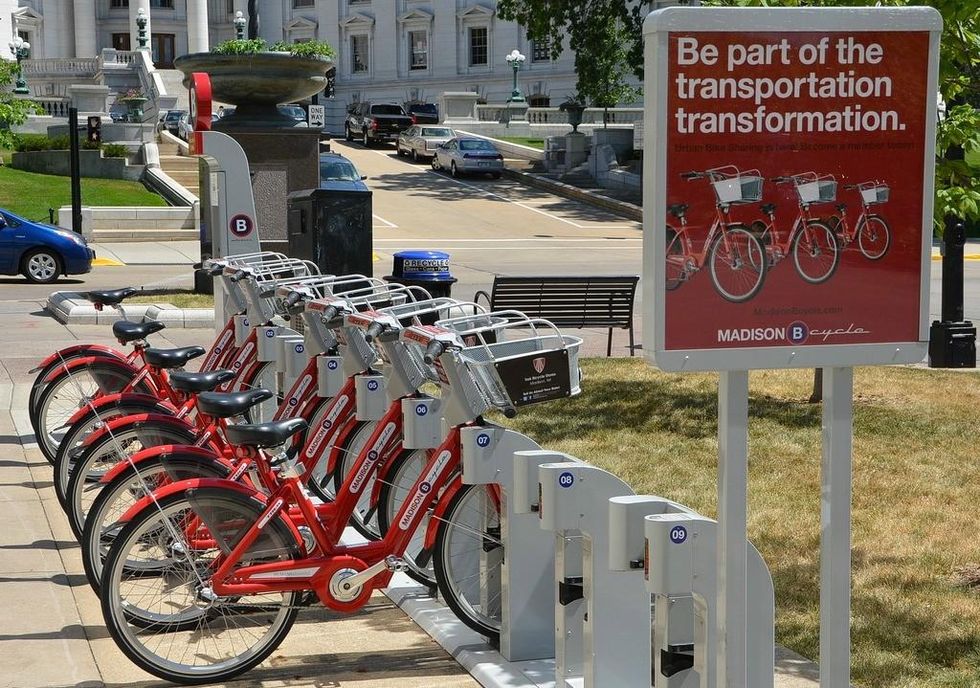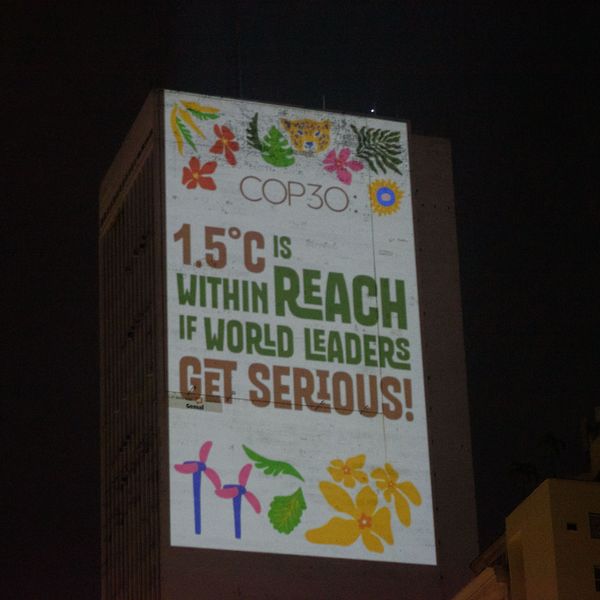Cities Take Note: University Campuses Are Providing Models for Sustainable Transportation
New report shows car-reducing programs at campuses across the U.S.

Released Wednesday from the U.S. PIRG Education Fund, the report, "New Course: How Innovative University Programs Are Reducing Driving on Campus and Creating New Models for Transportation Policy," details how strategies such as those that foster biking and car-sharing on campuses provide benefits that reach into the surrounding communities.
Initiatives that create less car-dependent campuses help by saving money, as land is often hard to come by land and expensive, and parking structures can be costly to construct and maintain; they help the environment by reducing car-related greenhouse gas emissions; they foster better town-campus relations by reducing seasonal high car-traffic; and they respond to the desires of Millenials, a generation the reports says is "leading a national trend toward reduced driving."
"It's no wonder that universities are leaders in finding successful ways to make it easier for people to drive less."
--Phineas Baxandall, US PIRG Education Fund"These efforts are saving money for universities, and improving the quality of life on campus," said Phineas Baxandall, a co-author of the report and Senior Analyst at U.S. PIRG Education Fund.
Many campuses have been fostering the use of bicycles as means of transportion by creating more biking paths, utilizing bike-sharing programs and providing sufficient bike racks.
One campus the report points to is the University of Wisconsin-Madison, which the report calls "a leader in encouraging bicycling among its students, faculty and staff," and where 22 percent of students bike to campus in good weather. For football games, UW-Madison even offers a free of charge bike-valet service. Further, the report authors write, on top of expanding bath paths and providing sheltered bike lockers and cages,
UW-Madison's University Bicycle Resource Center, located in the middle of campus and staffed by student employees, offers cyclists free use of tools and other supplies needed for tune-ups, as well as free bicycle repair manuals and bicycle maps.
Other campuses have fostered car-reduction through carsharing and ridesharing initiatives.
As part of a University of California, Davis environmental sustainability project called goClub, goCarpool
offers a number of incentives [like free ride-matching service and discounted parking spots] that encourage students (and faculty and staff) to share rides to campus by making it cheap and more convenient, as well as providing alternatives to ensure that people are not left without easy transportation if rideshare options are not available.
"Universities have a lot in common with cities," Baxandall stated. "They must get the most value out of limited land, they are acutely aware of problems associated with being overrun by cars; and they need to focus on the tastes and aspirations of young people. It's no wonder that universities are leaders in finding successful ways to make it easier for people to drive less."
The report states that "public decision-makers around the country should look to universities and colleges for proven, forward-thinking ways to align transportation policy with the values and behaviors of a new generation, while delivering benefits for the community today."
_____________________
An Urgent Message From Our Co-Founder
Dear Common Dreams reader, The U.S. is on a fast track to authoritarianism like nothing I've ever seen. Meanwhile, corporate news outlets are utterly capitulating to Trump, twisting their coverage to avoid drawing his ire while lining up to stuff cash in his pockets. That's why I believe that Common Dreams is doing the best and most consequential reporting that we've ever done. Our small but mighty team is a progressive reporting powerhouse, covering the news every day that the corporate media never will. Our mission has always been simple: To inform. To inspire. And to ignite change for the common good. Now here's the key piece that I want all our readers to understand: None of this would be possible without your financial support. That's not just some fundraising cliche. It's the absolute and literal truth. We don't accept corporate advertising and never will. We don't have a paywall because we don't think people should be blocked from critical news based on their ability to pay. Everything we do is funded by the donations of readers like you. Will you donate now to help power the nonprofit, independent reporting of Common Dreams? Thank you for being a vital member of our community. Together, we can keep independent journalism alive when it’s needed most. - Craig Brown, Co-founder |

Released Wednesday from the U.S. PIRG Education Fund, the report, "New Course: How Innovative University Programs Are Reducing Driving on Campus and Creating New Models for Transportation Policy," details how strategies such as those that foster biking and car-sharing on campuses provide benefits that reach into the surrounding communities.
Initiatives that create less car-dependent campuses help by saving money, as land is often hard to come by land and expensive, and parking structures can be costly to construct and maintain; they help the environment by reducing car-related greenhouse gas emissions; they foster better town-campus relations by reducing seasonal high car-traffic; and they respond to the desires of Millenials, a generation the reports says is "leading a national trend toward reduced driving."
"It's no wonder that universities are leaders in finding successful ways to make it easier for people to drive less."
--Phineas Baxandall, US PIRG Education Fund"These efforts are saving money for universities, and improving the quality of life on campus," said Phineas Baxandall, a co-author of the report and Senior Analyst at U.S. PIRG Education Fund.
Many campuses have been fostering the use of bicycles as means of transportion by creating more biking paths, utilizing bike-sharing programs and providing sufficient bike racks.
One campus the report points to is the University of Wisconsin-Madison, which the report calls "a leader in encouraging bicycling among its students, faculty and staff," and where 22 percent of students bike to campus in good weather. For football games, UW-Madison even offers a free of charge bike-valet service. Further, the report authors write, on top of expanding bath paths and providing sheltered bike lockers and cages,
UW-Madison's University Bicycle Resource Center, located in the middle of campus and staffed by student employees, offers cyclists free use of tools and other supplies needed for tune-ups, as well as free bicycle repair manuals and bicycle maps.
Other campuses have fostered car-reduction through carsharing and ridesharing initiatives.
As part of a University of California, Davis environmental sustainability project called goClub, goCarpool
offers a number of incentives [like free ride-matching service and discounted parking spots] that encourage students (and faculty and staff) to share rides to campus by making it cheap and more convenient, as well as providing alternatives to ensure that people are not left without easy transportation if rideshare options are not available.
"Universities have a lot in common with cities," Baxandall stated. "They must get the most value out of limited land, they are acutely aware of problems associated with being overrun by cars; and they need to focus on the tastes and aspirations of young people. It's no wonder that universities are leaders in finding successful ways to make it easier for people to drive less."
The report states that "public decision-makers around the country should look to universities and colleges for proven, forward-thinking ways to align transportation policy with the values and behaviors of a new generation, while delivering benefits for the community today."
_____________________

Released Wednesday from the U.S. PIRG Education Fund, the report, "New Course: How Innovative University Programs Are Reducing Driving on Campus and Creating New Models for Transportation Policy," details how strategies such as those that foster biking and car-sharing on campuses provide benefits that reach into the surrounding communities.
Initiatives that create less car-dependent campuses help by saving money, as land is often hard to come by land and expensive, and parking structures can be costly to construct and maintain; they help the environment by reducing car-related greenhouse gas emissions; they foster better town-campus relations by reducing seasonal high car-traffic; and they respond to the desires of Millenials, a generation the reports says is "leading a national trend toward reduced driving."
"It's no wonder that universities are leaders in finding successful ways to make it easier for people to drive less."
--Phineas Baxandall, US PIRG Education Fund"These efforts are saving money for universities, and improving the quality of life on campus," said Phineas Baxandall, a co-author of the report and Senior Analyst at U.S. PIRG Education Fund.
Many campuses have been fostering the use of bicycles as means of transportion by creating more biking paths, utilizing bike-sharing programs and providing sufficient bike racks.
One campus the report points to is the University of Wisconsin-Madison, which the report calls "a leader in encouraging bicycling among its students, faculty and staff," and where 22 percent of students bike to campus in good weather. For football games, UW-Madison even offers a free of charge bike-valet service. Further, the report authors write, on top of expanding bath paths and providing sheltered bike lockers and cages,
UW-Madison's University Bicycle Resource Center, located in the middle of campus and staffed by student employees, offers cyclists free use of tools and other supplies needed for tune-ups, as well as free bicycle repair manuals and bicycle maps.
Other campuses have fostered car-reduction through carsharing and ridesharing initiatives.
As part of a University of California, Davis environmental sustainability project called goClub, goCarpool
offers a number of incentives [like free ride-matching service and discounted parking spots] that encourage students (and faculty and staff) to share rides to campus by making it cheap and more convenient, as well as providing alternatives to ensure that people are not left without easy transportation if rideshare options are not available.
"Universities have a lot in common with cities," Baxandall stated. "They must get the most value out of limited land, they are acutely aware of problems associated with being overrun by cars; and they need to focus on the tastes and aspirations of young people. It's no wonder that universities are leaders in finding successful ways to make it easier for people to drive less."
The report states that "public decision-makers around the country should look to universities and colleges for proven, forward-thinking ways to align transportation policy with the values and behaviors of a new generation, while delivering benefits for the community today."
_____________________

